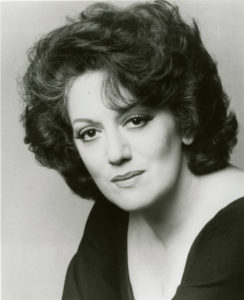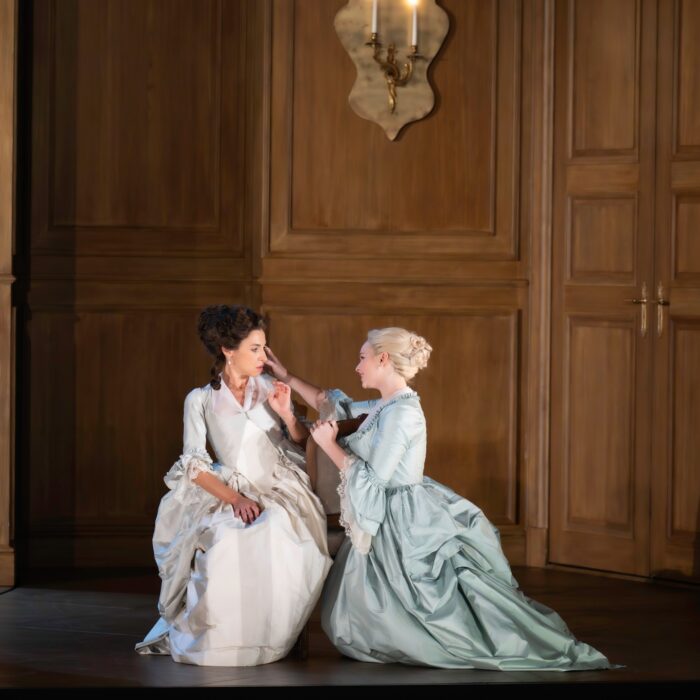
Tatiana Troyanos, Artistic Extraordinaire – One of OperaWire’s Writers Remembers the Diva From a Unique Perspective
By Lois SilversteinBaroque opera was new to me in 1975. When San Francisco Opera announced it would premier a work of Monteverdi, one of the progenitors of Italian opera, I debated whether to audition for another non-singing Super role with the company.
I had a whole other life to consider—professional and familial. With nightly rehearsals over the course of six weeks in addition to the five performances of the opera, the time and energy commitment was daunting.
On the other hand, “L’incoranazione di Poppea” was Monteverdi’s last and, to some, greatest opera—a rich score with a libretto by Giovanni F. Busenello who was inspired by Tacitus’ ‘Annals’ of Ancient Rome (c. 64 B.C). While the Nero of this opera is the same sadistic Nero of history, he does not murder in this musical work. Oh, he’s corrupt—as are Ottavia and Poppea—but love rules the day in the tale. Vice dressed as virtue reigns supreme throughout. How would San Francisco Opera address that theme?
The creative team was stellar consisting of notable artists such as Raymond Leppard—renowned British-American conductor and harpsichordist, and one of the key persons who stirred the rebirth of Baroque music, in particular, the music of Claudio Monteverdi. Guenther Rennert, a well-known German director and cohort of Wieland Wagner and Walter Felsenstein, would mount the production; well-known Swiss tenor Eric Tappy, mezzos Beverly Wolff and Maureen Forester, and young rising star, American mezzo, Tatiana Troyanos, filled out the cast. Although it was unclear how my involvement with opera would shape my own artistic life, I knew it would certainly be a valuable musical education. That was it. I decided to join.
When I nabbed the role of one of the four silent handmaidens to Ottavia, Empress of Rome, whose drama was a love triangle with her husband, Nero, and his favorite courtesan, Poppea, I knew I would get more than an autograph in the end. The first rehearsal was one week away in July.
Week one
Primary task: To follow Ottavia around, two feet to center, three to the left, often kneeling as she fulminated against her plight, plotted to kill Poppea and then moaned about her upcoming exile.
The unique advantage of this part was that I witnessed up close, the age-old conflict of woman versus woman, particularly for the love of a man—the “Will I Be Chosen or Left Behind” mentality. Such rivalry is always good theatre, no question, but how would it fare in 1975 when contemporary women were hard at work trying to liberate us from that very contest? How would Gunter Rennert direct it and how would his male perspective influence his artistic choices?
Week Two
None of the main stars were present yet. They were preparing on their own, in their own cities and countries, and would join in person once the production when itself was well-prepared. Opera productions are built, I learned, bit by bit, once the vision is established, stone by stone, like architecture.
My immediate task was to practice kneeling to the Empress and watch, from downcast eyes, how this 250-year-old competition would unfold—especially as two men created it and set it in motion with castrati as well as female singers.
While I was instructed and guided by two impressive male artists in rehearsal, I kept wondering how that male perspective would influence the direction for even our small parts. A heavily female cast, I dreamt of one day working under a female director, or conductor for that matter, to compare the differences—if any—in approach.
Week 3
Rehearsals went on, as usual, with much waiting and standing around while “gli maestri”, the conductor and director, moved from notebook to clipboard to on and off-stage. All the while, we had to remain focused, present, and keep Ottavia in mind as our hub. It was a challenge.
I was new to this genre of opera, and Tatiana Troyanos was in the midst of her ascent to stardom. Prior to this Poppea, she had sung such roles as Dido, Cleopatra, Judith, Jocasta, Sister Jeanne and other meaty female characters. She had also sung the role of Poppea in Stuttgart.
She was also renowned for her “trouser roles”—women singing male characters—such as Ottavian, Cherubino, Sesto, and even Caesar.
“It made me a better actress,” she said of playing Cleopatra and Caesar back to back. “I loved doing it.”
When asked whether she’d rather play somebody’s mother or a man, she said she preferred to play a man as long as every once in a while she got to wear a beautiful dress. In San Francisco, Troyanos’ Poppea was definitely a role in a dress. Robert Commanday, well-known San Francisco music critic, hopped on that Troyanos bandwagon after the opening: “The means by which Poppea seduces Nero sung by the sensational young mezzo, Tatiana Troyanos, could liquefy even stone….”
Week 3, Day 4
Backstage, I overheard a couple of cast members comment on how dedicated Troyanos was to mastering the scores of the operas she performed. She was known to jot down so many notes that one soprano called it a diary. A Greek-American born and raised in Brooklyn, she was fastidious with her singing diction, whether the role called for Italian, German, French, or another operatic language. I especially admired this kind of seriousness and dedication.
Week 4, Sunday night.
The night before our Poppea arrived, I heard one musician say how much Troyanos reminded her of Maria Callas, also a Greek-American. When I rode the bus up Stanyan Street that night, I thought of how much it took for Callas to take on the opera world when she did, ruled as it was by a strong hierarchy of men used to giving women orders.
Monday night
Finally I met her—the tall, svelte, dark-eyed beauty. She stepped on-stage with conviction. Before she even sang, I saw a woman who knew she was. She paid incredible attention to detail on-stage, to her fellow performers, to the conductor and director, while simultaneously speaking her mind thoughtfully and and courteously. Alert and at ease, she was a natural. She alluded that while she was creating the character of Poppea, she didn’t want to lose herself in it.
“It’s like life. You don’t want to just lose the control. You want to present a dying scene, but you don’t want to die in a way that is not believable.” In a later interview, she added, “If you get too immersed in a character, you can make a mess—no sense in being on-stage then, where you’re to perform and portray a character.”
Although she didn’t sing full voice in this rehearsal, when she did sing, it was clear she was pulling her own strings. Her warm, rich mezzo-soprano voice proved both intimate and passionate and offered a rich palette of colors. As the days went by, it was clear with each rehearsal that she was the complete package—complete focus and dedication, as well as lyrical beauty and depth.
Week 5
More and more of the scenes were rehearsed in sequence as we moved closer to opening. I cherished the moments off-stage when I could stand in the wings and gawk at Troyanos’ brilliance, as well as the moments sharing the stage with her from palace to courtyard to bedchamber and beyond. Granted, these were side views, and only gave a fraction of the full theatrical landscape.
After seven days a week of rehearsals for six weeks and five nights in performance though, you begin to piece those fractions into a tremendous whole. What I ultimately got was the true Troyanos “Poppea”—incredible physical presence, seductive, clever, intentional. She was an exemplar. She transformed from Empress to lover seamlessly. When she sang full-voice to test the house acoustics, moving the whole production caravan another step closer to performance, it was as if her voice rose from solid ground upwards, into the sky. I grew more than starry-eyed.
Observing Troyanos became a school for life really—how to balance warmth, vivacity, and dedication. She was an artist who sang her part and also sang for art itself.
“Instinct is a great matter,” Shakespeare’s Falstaff says, and it could not be more true for any woman in those early women’s movement days.
“It’s one thing to have talent,” Troyanos later said in interview. “You also need to have the talent to know what to do with it.” Eureka. For Poppea to become Empress as well as Nero’s wife, she had to wield her tools deliberately—definitely a young woman’s educational directive.
First Dress Rehearsal
“Pur ti miro,” the exquisite duet Troyanos and Tappy sang at the opera’s end, was a “tour de force.” The lovers intertwined their words and the notes around each other with sublime expertise. In all their gilt and glory, the music, lyrics, and sensuality wove ambition and love around each other—one beginning where the other left off, wrapping the whole in a gorgeous twist of time and space.
Today
And then it was done. In the decades since, I have gleaned more about Baroque opera and life. I still feel grateful for the “weisheit,” wisdom, Troyanos imparted to me through her actions. She remained a full-bodied human being who performed her roles and exacted the courage and confidence to sustain herself while doing so. She inhabited how to go about living one’s life while creating art.
When opera is accused of being an activity of the elite, I think of her Poppea, and the other roles she played over the course of her career, and how she managed to balance simple visual and audible splendor with authentic and prescient art—opera at its best. What she said about performing, I apply to being a spectator.
“It’s as if you have to integrate it within oneself… You have to get up there and do it. You have to have an idea of what you want to present and how to present it. It has to make sense to you. It has to be integrated in yourself, and the only way to do that is to think about it, then do it, and then make mistakes and do it again, over and over, until it becomes part of you. Then maybe you can get the drama and the music so that they’re both speaking and they’re both alive. But applause isn’t something you crave or that you want at all. It’s like you’re part of this metamorphosis of experiences, and it isn’t anything one wants applause for.”
I heard a remarkable story about Troyanos singing on the last day of her life, in Lenox Hill Hospital for other patients, one of whom told her that this was the first time in three years that she had completely forgotten her pain.
Through the recordings of her sumptuous voice, you hear her deep commitment to her art. Through them, you discover, as if for the first time, the ardor and beauty her artistry, and art lead into a realm that doesn’t die and that lifts us beyond just the present.
Categories
Special Features


